Note
Yeah, can you share your thoughts on Mikoto's SA themes?

a popular topic...
honestly i feel like most people are aware of his sa themes without actually realising they are. cuz mikoto as a character has a lot to do with coercion, with loss of/destruction of identity, with having a lack of bodily autonomy, etc. these are sa themes.
i understand that most find it icky and ignore that fact because they would rather never engage with sa themes, but it is worth acknowledging that sa isn't some uniquely evil or 'different' kind of abuse. it's evil and abuse and it's a violation the same way psychological and physical abuse is. so there can always be an overlap and ambiguity in how certain acts are framed and read.
at the end of the day, whats the real difference between having his rights, body and personhood violated by the warden and his job (through coercive self-identification into being a pwDID, passive model prisoner, subjugated model worker ... through being psychologically abused and pushed beyond his mental limits without his consent ... through having his body abused, kicked around and chained ... through being forced to perform himself in an abusive environment he cannot escape ... through being constantly surveilled, etc.), and having his rights and personhood violated through a more explicit sexual assault. at the very least, these established norms for how he is mistreated and often violated definitely lay the groundwork for further explorations of how he may/can be abused.
i also really need to comment on the birthing imagery when it comes to how he conceptualises his other selves. if he 'gives birth' to his other selves, that implies the stress and trauma he had 'impregnated' him. and you can do a lot with the body horror of pregnancy, and being instilled with something foreign and intrusive and yet forced to carry it and feed it with your body as it develops inside you. that to me creates a really lovely metaphor for how he feels about his dissociative parts – he doesn't recognise them as himself, they feel like foreign, intrusive entities put 'into' him by how his work life has violated him, and as a result of his abuse, he is now no longer 'himself' – his body now carries 'himself' (a shattered, broken man), and the product of his physical and psychological violation. these are sa themes.
im sure people have also spoken about how hes made into eye candy during MeMe. he is a highly erotic character and is framed very sexually in that MV, entirely without his consent. what he has become as a result of his abuse and violation (a murderer within Milgram) has also provided us an MV that features him undressing, washing, and watched from within his home from the POV of a hidden camera. once he's been violated once, he is violated again, and again, because of the precedent it set and how it transformed his identity. his personhood, by the time he arrives to us, has been reduced to something for others to take advantage of, mold to their will, and thirst at. like i cannot emphasise enough how constantly and wholly mikoto is psychologically, physically, sexually violated by his life, by Milgram, and by us, the viewers. these are sa themes.
and idk man, theres more. the more insane people in this fandom can definitely pick up on more things and details than i have... but if youve never considered this before, i hope you understand now.

in conclusion. gangrape survivor king
18 notes
·
View notes
Text


more mikoto x fight club hi
close ups


i think i worked on this for 5 days...i really like it...
83 notes
·
View notes
Text
girl: ahh i've just been dealing with a lot y'know? it's like the world wants me dead haha
me (completely stonefaced): i will be your shield
her: what?
31K notes
·
View notes
Text

Mikoto, The Hate Man How have I not heard anybody talk about this song for Mikoto? It is insanely fitting for him
192 notes
·
View notes
Text

w yanpwej okiakja ksao ia w nkyg-awpejc iqgxwjc
139 notes
·
View notes
Text

milgram analysis: how mikoto introjects and conforms himself to social misconceptions around DID
analysing mikoto's character, how Milgram frames DID to characters and audience, and following how mikoto's sense of self and presentation develops in response to Milgram and the DID label.
(google docs ver for ease of reading)
will be referring to milgram-en's (John Doe, Neoplasm, interrogation) and Maristelina's (timeline) translations. thank you for your work!
note on content: i am die-hard autistic about DID representation.
as of writing this essay, i've already written two long analytical essays criticising mikoto's reception, and sharing my (strong) opinions on how i believe his DID functions.
while it's not necessary to have read my previous essays to understand this one, if you would like to understand my take on him in more depth, or just read more of my criticism around DID representation, you can find links to them here on my website!
note on names: for the purposes of this post:
mikoto refers to the person/system, all parts included
'mikoto' refers to any normative part of mikoto, when intentionally distinguished (ie. when the idea of mikoto having a 'normal' self is evoked and spoken of in opposition to an 'other' self)
mikoto (俺) refers to the 'othered' mikoto that appears in the John Doe (Trial 1) voice drama and attacks es. it also refers to the 'othered' mikoto from the timeline conversations, as that is the pronoun used, although these are not necessarily 'the same alter'.
mikoto (オレ) refers to the 'othered' mikoto that appears in the Neoplasm (Trial 2) voice drama and claims to be the alter who commit murder.
i'm working with translations and 09 is a complicated character, so please forgive any slip ups!
thank you for reading.

introduction: why do social misconceptions matter?
in my experience, a lot of discussions about mikoto are dominated by the fact that he has DID.
more specifically, i find that a lot of discussions around mikoto are dominated by the impression that his dissociative disorder indicates that 'plurality' or 'systemhood' is his inherent state of being. i find many people believe that having DID makes you 'a system' of discrete parts / alters / personalities, while others who do not suffer from DID, are not. therefore, the reveal of mikoto's DID is the reveal that mikoto is not one identity, but instead a 'system' of multiple alters that are yet to be defined and discovered.
this way of understanding mikoto leads many to interpret es', jackalope's, and kotoko's labelling of mikoto with DID as a generally neutral act — or even a positive one.

while mikoto, for the most part, is not aware of his DID, and being forced to be aware of his symptoms may be destabilising, because it is a 'fact' he has DID, this label being applied to him would seem to ultimately be an act that brings us closer to understanding mikoto and the truth that lies within him. it would seem that by reaching this label, adapting how we see him according to it, and subsequently communicating with mikoto's alters as individuals, all es does through their labelling of mikoto with DID is 'uncover' a 'truth' about mikoto and act accordingly, as one should.
in my opinion, having preconceptions about how one's self operates and would benefit from being treated, just because their symptoms correspond to a diagnostic label, is misguided and dehumanising to the mentally ill. more specifically to mikoto, i think these preconceptions have completely overridden any potential discussion about his themes, character influences, and the commentary on power dynamics, toxic social expectations, and coercive self-identification that Milgram provides.
mikoto is not just a character that suffers from the symptoms of DID. mikoto is, also, a highly socially conscious, adaptable, and vulnerable character, that is an expert at gleaning the expectations placed on him by those in power and authority, and conforming to them, to spare him from scrutiny and gain social benefits.
i believe mikoto's relationship to the label of DID and his 'systemhood' is less so about indicating his inherent state of being, and moreso a tool he adopts due to the social position he is placed in during Milgram, that he uses for his survival, and introjects to protect his self-image.
or: i believe mikoto actively responds to the label of DID as it is applied to him, gleans the social expectations of the label, and acts accordingly, introjecting a 'multiple' way of seeing his self as a way to make sense of his inner turmoil, and playing the cards he is dealt socially, taking advantage of the audience's preconceptions around those with DID to help him avoid responsibility for his acts.
enjoy the read. i have a lot to cover.
main body 1: culture and conformity (quick section)
let's first put him into context.
being a person that suffers from a mental illness changes how you engage with the world.
not does being mentally ill mean you are considered to be atypical in how you view and interact with the world, with that difference causing impaired functioning and disruption to your health, but being mentally ill also impacts how others and wider society treat and value you, and subsequently how you treat, see, and value yourself.
in many societies, including japanese, having mental illness is a source of shame. because being considered mentally ill - having impaired functioning - involves the inability to fulfil an expected societal role or conform to societal and social expectations, being labelled as and functionally mentally ill often reaps the consequence of being unable to fit into society: being ostracised, being deemed an 'other', a worthless human, and/or a threat.
under the threat of ostracisation from their societies, and in the avoidance of shame, many people, such as mikoto, value their social roles, and have strong ideas about how they 'should' act and how they 'should' progress through life. should they struggle with their mental health, or otherwise feel that they are not acting or existing as they 'should', many will do anything in their power to maintain the illusion of functioning and normalcy, sacrificing their wellbeing in private and repressing any parts of themselves that they deem socially unacceptable.

mikoto, on practically every level in his life outside of Milgram, is not in a position to engage with the notion of being nonconformist. there is too much at stake for him, in his livelihood, his social position, his familial responsibilities, and his self-image.
it has been, and continues to be, vital for mikoto's survival that he stick to his established social role and conform to any social expectations placed on him, even if it causes him harm, because by aligning himself with the expectations of those with power over him, he can expect those in power and authority to favour (or overlook) him, helping him avoid scrutiny, shame, and the loss of everything he has sacrificed for.
this approach to navigating the world is ingrained in mikoto, and brings us the mikoto we encounter in Milgram.
main body 2: mikoto and social expectations
milgram.jp/character/mikoto (Profile): 常識人なりに常に状況に対して順応しようとしている。 tl: "A sensible* person who is always trying to [adapt/conform/acclimate/accomodate] to whatever the situation is." By "sensible", it means acting in accordance with prudence and propriety with the mores. (@milgram-en)

mikoto is first introduced to us by emphasising how 'normal', average, and "sensible*" he is, and the fact he is a man that is "always trying to [adapt/conform/etc.]" to the situation at hand, conveying how attuned and aligned he is to social expectations. he also describes himself along these lines, emphasising his desire to be seen as a conformist and non-objectionable individual.
outside of the impression of normalcy he intentionally gives us, it is also likely that mikoto genuinely sees himself in this way, due to his own avoidance and a psychological need to protect his sense of self. (I speak in this essay about mikoto's relationship to shame.)

mikoto's desire to be seen and see himself as non-objectionable extends to a pathological degree; he displays a severe disconnect from unacceptable parts of his identity (such as his ever being angry before) that instead manifest in his dissociative parts,
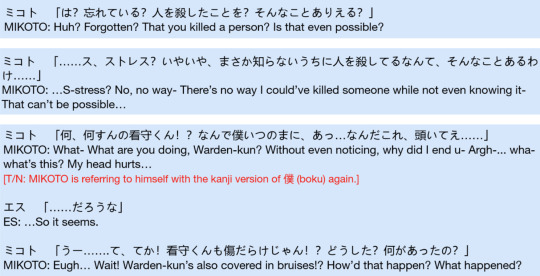
he appears to / acts as if he has have no memory of his murder, and violent outbursts,

my friend pointed out that the dream imagery in MeMe and Double may be suggestive of his derealisation (it may imply he does have memory of his murders, but it feel so unreal and foreign to him that he can only feel that it must have been a bad dream he had),

and when pushed on the matter that he may be a murderer and have just forgotten, he has a panic attack, and his normative parts are forced to switch out and disengage, ensuring his dissociation from everything unacceptable about him, including the fact that he is a murderer, remains intact.
these traits mikoto has early on in Milgram are indicative of the person he has developed to be as a result of his upbringing and sociocultural influences. his social expectations outside of Milgram, to name a few, are to be operational, obedient to authority, and to conform. he cannot be, and therefore 'is not', strange, abrasive, mentally ill, or a murderer.

however, Milgram itself is a society in a sense, with its own social expectations, norms, and statuses. in John Doe, mikoto's insistence on his normalcy is rejected, due to being incongruent with the reality of Milgram, that denotes that he is a murderer. es attempts to force mikoto to acknowledge the reality of Milgram, and although he initially shuts down, dissociates, and is forced to switch, mikoto's resistance to the label of murderer is a losing battle, and he knows it.
milgram.jp/character/mikoto (Profile): 夜中になってもミコトの監獄からは物音がするため、いつ寝ているのかがわからないと囚人の間で話題。 tl: "There are noises coming from Mikoto's prison even in the middle of the night, and the prisoners say they have no idea when he is asleep."
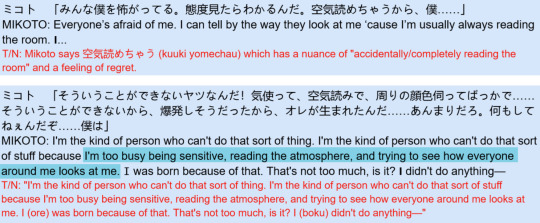
moreover, mikoto is attuned to the rising realisation that something is not right, and that others are becoming concerned about and afraid of him.
since the negative reputation mikoto gains in Milgram amongst his fellow prisoners would seem to be about the seemingly aggressive actions of his other parts (such as breaking things in his room while having meltdowns, defending himself against kotoko, and being judged unforgiven in Trial 1 following his (俺) violent outburst), mikoto likely feels he is not able to smooth this negative reputation over with his normative and passive demeanour alone, and likely feels very out of control of his circumstances, reputation, and self overall.
all of these indicate to mikoto that he is in a new, strange place, removed from his ordinary life, with a new authority (the word of the warden) to conform and appeal to, lest he ostracised, punished, scrutinised, and have his ego shattered.
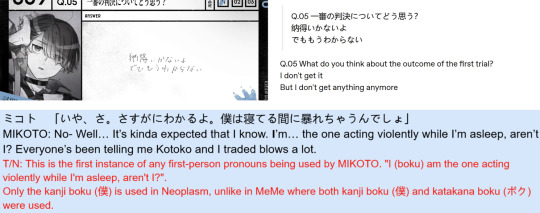
and interestingly, while he persists in being unable to integrate with his sense of self the idea that he is a murderer or commit violent acts, at the very end of John Doe he is bestowed a diagnostic label, that is then proposed to and adopted by Milgram's figure of authority. this label he finds applied to him is one that carries a preconceived notion around his personhood, and may just free him from having to challenge his fragile self-image, and instead blame everything unexplainable about him on an external force, if he just plays along.
main body 3: mikoto and the label of DID

at the end of John Doe, and following mikoto's (俺) switch and violent outburst at es' prodding, kotoko armchair diagnoses mikoto with DID.
(at the beginning of Trial 2, Milgram (through jackalope) would seem to have confirmed this to be an accurate assessment, but in my opinion that's neither here nor there; just because he 'has' a disorder, does not make him an expert in it, necessarily honest about his symptoms, or immune to playing up his presentation for social benefits or because of outside influences that coerce how he conceptualises himself in light of the label.)
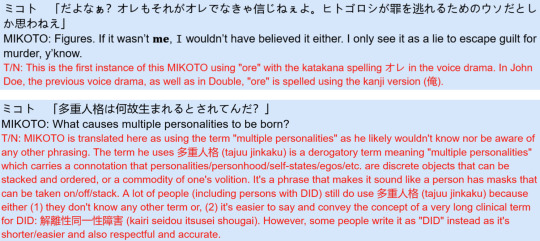
when understanding what this act of labelling could mean to him, it's important to establish that, up to the beginning of Neoplasm, mikoto himself seems to a) not be aware that this is a condition he suffers from, and b) only really have a surface level knowledge of what DID is. he asks es about basic functions of and theory around the condition, and even confesses that in es' shoes, he would have assumed someone claiming to have DID was a liar trying to dodge responsibility.
that is to say, from the moment he realises this is a label being applied to him, the only real information he has about what this label means and what his social position is now is lifted directly from what es tells him, and what we, as the audience (that he hears as 'voices' between Trial 1 and 2) apply to him. which is great for me. what a controlled environment to analyse.

in my opinion, the earliest point that mikoto may have realised the DID label / model was being applied to him, is at the end of John Doe. even implicitly, es introduces to mikoto the concept of there being 'another him' or some 'outside' force within him.

even earlier than that, kotoko very powerfully controls the audience's eventual discourse around how we should be thinking about him in light of the diagnosis. by directly tying the label of DID she applies to him to an abstracted debate about culpability in patients with DID, the status of 'person with DID' mikoto gains fundamentally becomes a question of if he should be 'let off' for his actions because of it. therefore, Milgram ensures that a leading debate when it comes to mikoto and his diagnosis is the possibility of being forgiven because it was not 'actually him' that commit those acts.
(i'm not sure where to fit this, but i do want to comment on the violence of applying this stigmatised diagnosis to him so carelessly and without his consent, and especially encouraging es to see him accordingly as a 'case' of DID ('real multiple personality disorder patient'), thus dehumanising him by transforming him into an abstract thought experiment. i personally think it's abusive and prejudiced to act like his personhood and manner of existing is for an authority to 'other' and define; despite his dissociation, mikoto does not express a desire to be seen as multiple alters until it becomes strategically useful, and i genuinely believe that applying the label of DID, and thus the model of 'systemhood'/'multiplicity' onto him, without his consent, is abusive and prejudiced. i believe any person's decision to see and express themselves as a 'system' of multiple selves must be done on their own accord and for their own benefit, and not because they are pathologised and somehow deemed inherently 'different' as a human being. ok, i just wanted to say this.)
all this to say, between Trial 1 and Trial 2, at the same time that mikoto is coping with and trying to make sense of this traumatic and strange situation, feeling out of control of his circumstances, reputation, and self, he is persistently hearing the audience discuss the notion that there could be 'another him' responsible for all his intolerable acts, behaviours, and personality traits, as well as the idea that this 'other him' is also 'not him', and that it is a possibility they may not hold mikoto responsible for the actions and existence of the 'other him'.
it has been, and continues to be, vital for mikoto's survival that he [...] conform to any social expectations placed on him, even if it causes him harm, because by aligning himself with the expectations of those with power over him, he can expect those in power and authority to favour (or overlook) him, helping him avoid scrutiny, shame, and the loss of everything he has sacrificed for.
as i've established, mikoto has a narrow self image. he is avoidant to acknowledging distress and possesses a psychological need to protect his sense of self and appear normative, functional, and socially acceptable, which he does by disowning parts of himself and dissociating.
not only is it helpful for him to play the cards he's dealt and adapt to the position he has found himself in to curry the favour of those in power (because frankly, weakly and confusedly resisting es' assertions of his identity as a murderer due to his normative parts' narrow sense of self is draining and triggering to him, and getting him nowhere in terms of Milgram), but i cannot emphasise enough how subconsciously appealing of an explanation it must be to him, to imagine that everything he has psychologically disowned actually 'isn't him', and therefore an aspect of his self he does not have to face responsibility or consequences for.
that is to say, although he truly suffers from DID and has truly dissociated from parts of his self so much that he cannot and refuses to recognise them as himself, because kotoko evokes the common and 'othering' misconception that alters are discrete and autonomous (and opens the debate about the possibility of not holding one responsible for the acts of the other), the audience's debate encourages mikoto to adopt the belief, outlook, and strategy that his alters are 'different people', distinct from him, and solely responsible for the acts mikoto has dissociated himself from.
main body 4: introjected stigma and self-conceptualisation
while i think on a lot of levels, mikoto conforms to the DID status as a tool for his Trial 2 interrogation, it is still worth noting that as a vulnerable, mentally ill person, with a narrow and socially reliant sense of self, mikoto does also grow to introject stigma and conceptions around the mentally ill, which negatively impacts on his self-image.
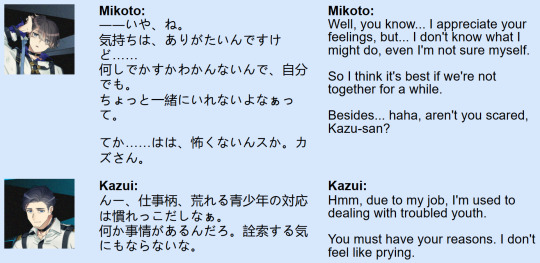
date: August 5th, 2024 (Kazui's Birthday)
even without es' presence to perform to and gain benefits, as Milgram progresses, mikoto appears to slowly grow to worry about himself and genuinely start to believe he is unpredictable and violent, thus seeking to isolate himself from others. he also demonstrates the assumption that kazui is in touch with the social consensus that there is something scary or strange about mikoto, and expects kazui to treat him and think about him accordingly.
AMANE: ...Who are you? How intriguing. Are you saying you are not Mikoto Kayano? MIKOTO: Ha- You're asking who am "I"? That's what "I" wanna know. Whoops, don't come any closer. I'm in a rebellious phase and there's no guarantee I won't kill you, brat [kid] or not. Just leave quietly.
date: October 6th, 2024 (Mikoto's Birthday) (source)
mikoto, later, also directly engages with the social consensus that there is something strange and scary about him. during his birthday interaction, mikoto (俺, it would seem, or at the least an 'other mikoto' that uses this personal pronoun, given that's what's written) actively portrays himself to amane as 'not mikoto' — a violent and unpredictable undefined existence, that people should stay away from, and reinforcing his established negative social perception.
this is in line with mikoto's growing internalised belief that, due to his (or, in having) mental illness, he is violent and unpredictable. as ore (俺)/'not mikoto' he is also able to engage directly with this introjected belief, and actively portray himself according to how he believes others see him, to reinforce that status for his goals. for this circumstance, his goal appears to be - again - to isolate himself, because he believes that there is something wrong with him, and believes that he may become violent for no reason, something he does not want to have happen. thus he threatens amane, reminding her of his poor reputation, and 'protects' her from himself.
(note: i am calling his belief that 'he is volatile' an introjected belief, and not entertaining the idea that he is just being honest about his own violent impulses, because despite his negative reputation, mikoto (regardless of self-state) has never demonstrated that he is someone who becomes violent 'for no reason'. in my opinion, by warning amane to stay away for her own safety, he demonstrates that he does not want to hurt her. moreover, the only fights he has engaged with were explicitly in self-defense: kotoko in physical self-defense (although is unaware of this context and attributes it to sleepwalking, furthering his belief he gets into violent situations without his control and unprovoked), and es in psychological self-defense, only after being pushed far further beyond his mental limits than any other prisoner.)
another goal in this interaction with amane could also be, in my opinion, the desire to protect himself through self-isolation. because mikoto is vulnerable to social scrutiny and shame, and feels as if he can't control his acts or how he is seen, it would make sense that he therefore strives not to be seen by or interact with anybody, allowing him to maintain at least some amount of control over his selfhood and the way he is seen. thus, just like his interaction with kazui, mikoto (俺) plays the cards he has been dealt to his advantage, and reminds others of his negative social perception, to secure a relative social safety in being isolated.
i also think it's worth commenting on the dimension of mikoto (俺) in this interaction being 'not mikoto', and the psychological and social advantages of playing into a sense of DID/multiplicity. i think a major aspect for how mikoto internalises the DID label and sense of an 'other mikoto', is because by cementing a 'not mikoto', it helps mikoto scapegoat his undesirable traits onto an 'other'.
when it comes to mikoto's (俺) warning to amane while he emulates the outcasted and rough social role he perceives as having, framing himself as 'not mikoto' allows him to act in the way he does to protect himself & others, without challenging his strong sense of what 'is' mikoto (ie. socially conscious, innocent, conformist, sensitive). thus, mikoto (俺) does what he needs to do, and by psychologically removing his self from the act, protects his ego and preserves - at least to him - the illusion of normative 'mikoto'.
moreover, it is likely his (俺) sense of being 'not mikoto' is also a genuine dissociative feeling he has. because 'mikoto' is a narrow identity that has disowned the majority of his own personality and humanity, and the traits and manners of existing contained in the 'other mikotos' are disallowed from being 'mikoto', it does beg the question to every other part of him of who they 'are'.
in my experience, drawing attention to (or god forbid, reinforcing) identity alteration/confusion makes it worse. therefore, i can believe that while in previous dissociative episodes mikoto has similarly felt 'altered' and 'not like himself', without the social pressure of Milgram and a preoccupation with the sense of DID, instead being preoccupied with his conformist identity and life responsibilities, he did not dwell on it, and quickly lost connection entirely with the instance in which he felt strange (either through estrangement and brushing it off, or forgetting it altogether).
in contrast, because in Milgram, DID and mikoto's strangeness is made to be at the forefront of his mind, the dysphoria inducing differences between what he thinks 'he' is like and what he is actually like become amplified. mikoto has likely become more alert to his idea of his 'self' and his manners of existing, leading him to more easily feel strange and 'out-of-character' for minor ways in which he does not conform to his narrow sense of self, which leads his ostracised parts to properly notice and be affected by their exclusion from mikoto's accepted sense of self. thus, they perceive themselves — and begin expressing themselves — as unexplainable, disowned, existences.
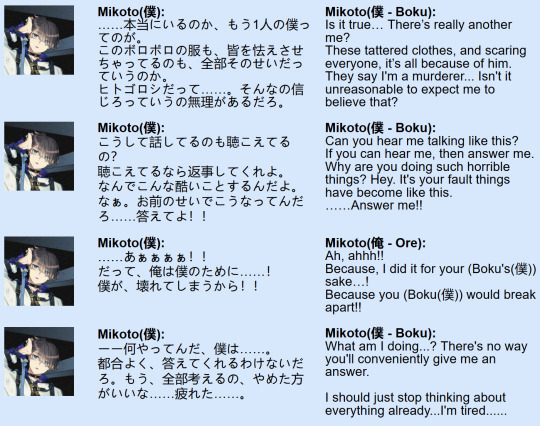
date: October 6th, 2023 (Mikoto's Birthday)
mikoto also directly confronts the idea that there is 'another him' during his 2023 birthday timeline conversation, and we even get to see two sides of him express their personhoods in opposition to one another.
i think this exchange really demonstrates how mikoto uses a sense of multiplicity to cope with his own shame and his fears around feeling out of control. by splitting himself in two, mikoto can both blame 'himself' for his traumas and social ostracisation, expressing his internalised shame and self hatred, while also preserving 'himself' as an innocent victim and externalising his grief.
the beginning of this interaction is, explicitly, because mikoto 'comes around' to the model of multiplicity people have forcibly applied to him. with it in mind, 'mikoto' makes sense of everything that has caused him grief and blames it on the 'other him'.
specifically:
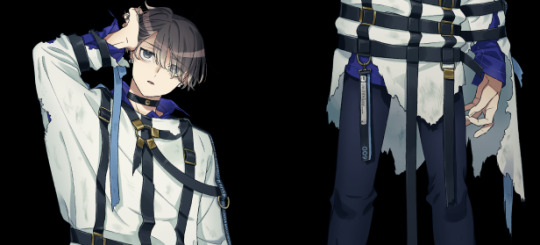
1. 'mikoto' blames the 'other him' for ripping his clothes: specifically, he blames the 'other him' for ripping his straitjacket he wears into t2 that, we can infer from the shreds, had incredibly long sleeves and bodice, and was likely used to restrict his movement and possibly restrain him.
therefore, while 'mikoto' blames the 'other him' for for the frightening state of his clothes, in context, mikoto's act to tear his clothes was one of resisting oppression. it was probably also an act of expressing more than a little rage at the injustice mikoto is facing in being incarcerated and abused.
'mikoto' does not acknowledge or sympathise with this context, and whether 'mikoto' is psychologically aware of this context to the 'other his' actions is unclear. it is possible his distress about his ripped clothes, and why he lashes out at the 'other him' for doing that, is because he is so dissociated that he is genuinely unaware of why he did this, and is frightened by the unexplainable and feeling out of control.
i think it's also possible that even if mikoto was aware of why he ripped up his straitjacket, he would not have sympathised with his past decision, and would still have verbally abused himself for acting out of line. because ripping the straitjacket is an act of resisting oppression — not conforming to his social position and submitting to authority — 'mikoto' likely finds it an unacceptable and dysphoric act. moreover, because ripping the straitjacket is more than likely an expression of rage, an emotion 'mikoto' does not allow him to express as 'himself' (and likely feels he has no experience with, as 'himself'), this goes doubly.
2. 'mikoto' also blames the 'other him' for scaring the others in the prison. i will assume this is referring to the loud noises he makes at night, the destruction of his property he does when angry, and the fight he gets into with kotoko.
(this timeline conversation takes place before the previous two i analysed, so i'll assume he hasn't began performing his 'othered' identity yet, in frightening others to protect them/himself. although, i have already covered why i believe he does this, and it's hardly malicious, so it wouldn't effect things either way.)
while it's understandable why mikoto and his fellow prisoners find mikoto's nightly crash-outs to be extreme, it's worth bearing in mind that not only is he having his rights abused, in a traumatic and triggering situation, and the only property he destroys is his own and in his own room, with no risk of anyone being caught in the cross-fire, mikoto does not have — and has never had — any healthy coping mechanisms for his anger outside of repression.
it is likely mikoto has no idea how to deal with overwhelming emotions, which not only makes them feel bigger and compound over his lifetime (as all he does is repress them, put them into a box for later, and act as if they do not exist), but also means that any time he does express them, it's not exactly in socially acceptable ways.
regarding his fight with kotoko, she explicitly attacks him first, and it seems it was only because he was 'ready' that he was able to hold his own and not be knocked unconscious (or worse, if you look at how mahiru ended up at her hands) like he was in John Doe. i think it's fair to say that any negative reputation mikoto receives for this scuffle is unfair, as is blaming an 'other mikoto' for 'scaring people' through it.
(it's also possible mikoto only perceives that people are scared of him because of his scuffle with kotoko, because he is projecting his own anxiety. it's entirely possible people are only scared of him because of the strange noises coming from his room, and his increasingly haggard demeanours, odd behaviour, self-isolation, and the fact they knew kotoko made an attempt on their life simply worries them, in a way they do not know how to approach. regardless of the reality though, he thinks others are scared of him, and punishes himself accordingly.)
thus, once again, 'mikoto' finds his — absolutely understandable, and often justifiable — expressions of anger and engagement in violence either unexplainable and frightening, or dysphoric and unacceptable, leading him to lash out to the 'other him' that he dissociates from, and that he associates with these acts.
'mikoto' also blames himself and his expressions of unacceptable emotions and behaviour for the abuse he is currently suffering within Milgram ("it's your fault things have become like this"). this is consistent with how mikoto has been conditioned throughout his life through his culture, to perceive any punishment, scrutiny, and inability to survive an unjust system as a flaw from within himself.
(this outlook also functions as a coping mechanism: by always finding the blame in himself, mikoto helps himself feel that he has control — believing that if he just does everything right, everything will turn out ok — saving him from the despair of acknowledging that social systems are often unfair, and pointlessly cruel.)
'mikoto' eventually receives a reply to his self-blame and verbal abuse after he begins to shout, with his 'other self' (who writes his personal pronoun as 俺 for this exchange) defending his actions (or the actions he identifies as having done) on the basis that he did it for 'mikoto'.
notably, mikoto (俺) never protests being blamed in itself, demonstrating that even in the parts of him that can stomach identifying with his deemed unacceptable acts and expressions, he universally lacks the self esteem to defend himself or consider it an injustice to be shamed. he also likely doesn't protest being blamed because the scapegoating of an 'other mikoto' is a source of stability for mikoto that allows normative 'mikoto' to be preserved, and thus is not a notion mikoto is willing to challenge; even if this had been a part that was willing to protest injustice, he cannot conceptualise doing so at normative 'mikoto's' expense, and also possibly cannot perceive injustice if it is at normative 'mikoto's' hands.
the interaction ends with 'mikoto' seeming to not hear mikoto's (俺) defense, and instead opting to stop thinking about this all. i personally read this as normative 'mikoto' being physically unable to process mikoto's (俺) response and dissociating very severely upon receiving one, demonstrating that normative 'mikoto', unlike his other selves, cannot directly behold his 'other selves' and parts, as they are so threatening to normative 'mikoto's' self image and enforced illusion of normalcy that characterises this part of him. therefore, it is likely that the maximum extent to how normative 'mikoto' can engage with the notion of DID / having other selves at this point, is, at best, to engage with them as an abstract concept and 'other', for the sole purpose of psychologically scapegoating.
to conclude this section, i have demonstrated that:
as a result of the rising sense that something is 'not right' with him, social sensitivity to his negative reputation, and the concept introduced to mikoto of there being 'another him' who could be held uniquely responsible for perpetrating his unforgivable acts, mikoto begins to psychologically split himself apart. he finds that he can only tolerate the reality of his situation so far, and although he is 'aware' that others are afraid of him and that he has done certain frightening things, due to his narrow and fragile normative self-image that he has cultivated to maintain his own acceptability and an illusion of control over himself, he finds himself drawn to the explanation of there being an 'other him'. from there, mikoto scapegoats all his intolerable acts and traits onto this unexplainable, abstract figure, who he feels — expressing his own intolerance towards himself — deserves to be shamed, blamed, and needs to stop doing the 'awful things' he does immediately.
in response to his new split self-perception and his preexisting complexes and weak sense of self, mikoto begins to consider himself an 'other mikoto' or 'not mikoto' whenever he finds himself in a self-state that acts or operates beyond his normative, tolerable, persona. as these newly mentally defined parts, he encourages his own psychological splitting and scapegoating, and comes to shoulder unique responsibility for his intolerable acts as his 'other selves', allowing him to maintain the security and purity of his normative persona, despite how Milgram persistently forces him to engage with an intolerable reality that would challenge it. due to natural differences between normative 'mikoto' and his 'beyond normative' self-states in what they can tolerate and engage with, mikoto (in his 'other' states) also finds himself interacting with his perceived negative social reputation, and occasionally leans into an 'othered' persona, portraying himself how he believes others see him (and how he has come to believe he 'is') — shameful, uncouth, and at risk of becoming dangerous, unprovoked — to protect himself, and others, from himself.
in this way, social stigma around mental illness, mikoto's poor relationship to himself, and the label of DID that Milgram introduces to him (the notion of there being an 'other him') drastically changes how mikoto conceptualises himself, and shapes to a massive extent how he comes to cope with Milgram — a new, traumatic and stressful society that he has found himself in.
main body 5: DID as a social tool
as established in section 3, the label of DID when applied to mikoto is fundamentally a thought experiment posed towards the audience about the culpability of persons with DID. as explored in section 4, due to the audience's suggestions and his own complexes, mikoto has begun psychologically dividing himself from the acceptable, innocent parts and unacceptable, guilty parts.
while, as mentioned in section 4, normative 'mikoto' seems unable to directly behold his 'other selves', and can only briefly entertain the thought as an abstract concept before shutting down — mikoto's 'other selves', already on the exiles of his identity, have no such phobia of the intolerable or enforced normalcy to sustain. thus, they can engage with, and negotiate according to, the model of DID and multiplicity that has been applied to them, directly.
in Neoplasm, ore (オレ) engages directly with the notion of there being an 'other mikoto', in order to scapegoat 'himself' for mikoto's crimes. this not only allows himself to protect himself psychologically, preserving an illusion of normalcy and innocence for normative 'mikoto' and encouraging Milgram to cease attacking his sense of self (instead bringing all the heat to the 'other him'), but is also vital for securing a forgiven verdict for himself, that ensures his physical safety and, hopefully, ultimate survival and freedom from Milgram.
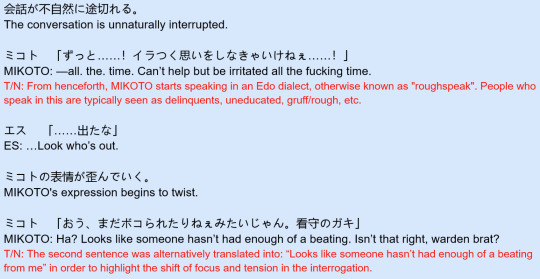
compared to John Doe, where mikoto (俺) switches in under immense emotional pressure, and never identifies himself as 'not mikoto', when switching in Neoplasm, mikoto (オレ) makes a point to draw attention to his change in personhood. he does this by responding to es' comment about his switch roughly, openly reacting to es as if he's only just laid eyes on them in a while, and immediately, suddenly, alluding to the events of the 'other mikoto' in John Doe.
all these choices communicate to es, and reinforce the idea that, mikoto is no longer 'himself'.
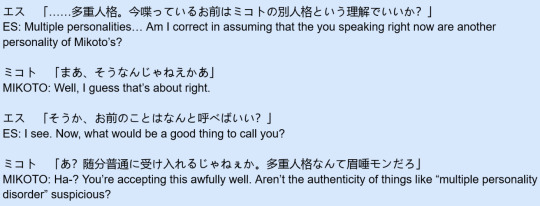
after mikoto (オレ) conforms to the stereotyped, expected behaviour of a person with DID (that, honestly, even mikoto is probably aware of: change your demeanour, say hi, it's a new guy) and alerting es to the presence of a different alter, es attempts to adapt to the situation according to how one may engage with a 'case of DID'.
in light of common preconceptions around DID, es demonstrates the assumption that mikoto's alter would have a unique name and personhood (or at the least, expresses the desire to assign mikoto's alter a name, as to distinguish him from 'actual/normal mikoto').
mikoto (オレ) demonstrates a consciousness about his social standing and the absurdity of the situation he has found himself in, reacting with surprise and suspicion that es is taking this turn of events so easily, and then attempts to gauge how much es actually believes what is going on. this is a very good and socially-conscious move — it would be incredibly embarrassing and ineffective to continue if the warden was only entertaining what they thought was a blatant lie.

despite mikoto (オレ) making a direct reference to malingered DID and its infamy in cases where people fake the condition to try and escape responsibility for murder, es' response assures mikoto (オレ) that, because they have decided he is an 'authentic case' according to jackalope's judgement and the consensus of the audience, it has never crossed their mind that he may still use its social status and misconceptions around it to his advantage.
which is fucking awesome for mikoto; he has just confirmed that whether or not he 'has' DID or has an 'other self' is not up for argument. now all he (オレ) has to do to secure his physical and psychological safety, is find a way to convince the warden that everything was 'not mikoto's' fault.
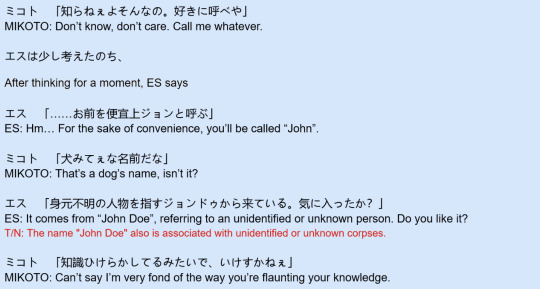
despite the fact that mikoto (オレ) expresses no desire to be named anything unique (having already dodged the question once), and immediately complains about the name he is given, refusing to affirm it, es insists on naming mikoto (オレ) 'john'.
in the act of giving mikoto (オレ) a distinct name, es draws a binary in mikoto, and creates the illusion of discrete personhood between mikoto's alters, borne from their, and the audiences', rudimentary misconceptions around DID. moreover, as my friends have pointed out, by assigning him a western name, typically reserved for animals and (in being derived from 'John Doe') things that are 'unknown', es cements the sense that mikoto (オレ) is an 'other' — whether that be not japanese (not aligned with their cultural values, ideals, and society), not human (but an animal, pet, or beast), or dubiously existing or definable at all. this, again, opposes mikoto (オレ) with his normative, conformist identity, reinforcing mikoto's dissociative ostracisation, and the sense, for the audience, that mikoto exists as a binary 'system'.
mikoto (オレ) is not pleased about this development initially, due to, presumably, not actually having a particularly distinct sense of self as an alter, and probably feeling pretty insulted by the name choice. however, es' decision here to personify 'john' and crystallise the sense that the 'other mikoto' is his own distinct being who contrasts mikoto, later becomes vital for mikoto's (オレ) negotiations, and is also crucial for crystallising mikoto's reception as a 'system'. so, thanks, es. this is a surprise tool that will help us later.
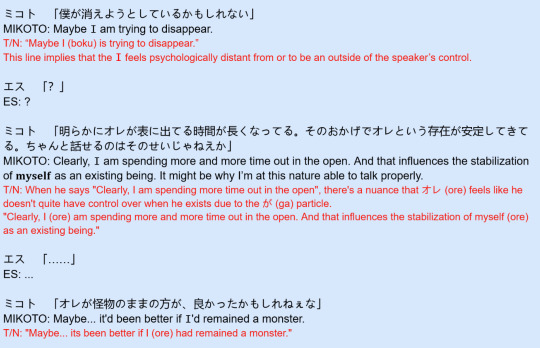
mikoto (オレ) first draws a direct parallel between himself and his normative self when musing to es about how frequently he has found himself in his 'other' states, being unable to exist in his normative selves due to the psychological damage of Milgram (that accuses him of murder, seeks to restrain him, and has him finding himself doing unacceptable acts, such as lashing out against injustice). thus, the first time mikoto (オレ) reinforces the binary between 'himself' and his normative selves is to frame 'his' continued existence, to es, as a threat to 'mikoto's'.
personally, i believe this is a genuine anxiety mikoto has: mikoto wants to be his normative selves, he wants to maintain a sense of normalcy, live a safe and unobjectionable life, and he feels ashamed and monstrous when he acts out of line from that. i find it likely that mikoto genuinely finds it distressing that he has so often not 'been' or felt 'right' since the unforgiven verdict, and is afraid he may lose himself forever if Milgram persists.
i also find that, by drawing attention to this dynamic, mikoto (オレ) presents getting 'rid' of himself (オレ) as a dire priority, and encourages the warden — who will hopefully be forgiving mikoto at the expense of 'john' — to act fast in making their decision, freeing mikoto from his emotional turmoil as soon as possible. he makes sure the warden is aware that under any more pressure, the illusion of normative 'mikoto' will be shattered forever; mikoto is on the verge of breaking, becoming unable to know who he is, know how to live, or know how to cope with his acts and existence.
or, in split-personality stereotyping terms, mikoto will 'disappear', and only 'john' will be left.
which, in the eyes of practically everybody involved, is not an ideal outcome.
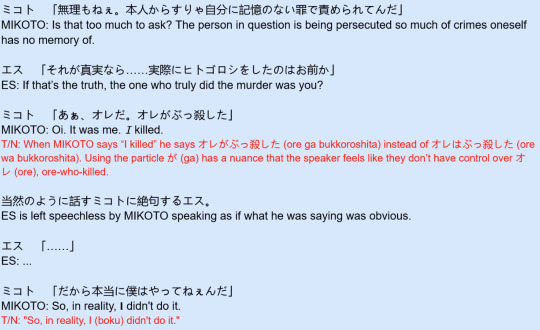
after asking es about a basic function of DID — what causes a dissociative separation between self-states — mikoto (オレ) ponders on why he (オレ) exists and has been himself (オレ) so often, and naturally beings to allude to 'mikoto's' distress at being persecuted for crimes he does not remember, rationalising that this is why his normative self has not felt conscious lately.
i feel that the way in which he expresses his relationship to his crimes ("the person in question...") draws attention to the unique selfhood of 'mikoto-who-does-not-remember', and conveys it at a distance, reinforcing both the idea that normative 'mikoto's' self has nothing to do with his murderous acts, and that this self is estranged from the mikoto that is speaking.
(according to my friend, the incredibly objective way he speaks here almost makes him sound like a defense lawyer (or other third party) representing his client. this tone and framing of his selves helps mikoto create the illusion that ore's (オレ) assessment of his normative self can be trusted — it's generally a lot more convincing to say somebody else didn't do it than that 'you' didn't do it — and discourages es from interrogating (attacking) his normative self any further, as he has a reliable, compliant, and well-spoken 'representative')
in light of ore's (オレ) compliance and confident, seemingly trustworthy assessments of his normative self, es seems prepared to take mikoto's words as the truth. and psychologically, i find it pretty understandable why they do.
in my opinion, the bulk of es' struggles with mikoto in John Doe can be attributed to that fact that es clings to a universal truth that Milgram is 'just' and does not make mistakes. es trusts that Milgram would not have brought in mikoto had he not commit murder, and uses this belief as the basis of their interrogation. however, mikoto is unable to face this fact; the universal truth he clings to in opposition to es is his normative reality and sense of self. therefore, during the bulk of John Doe, mikoto stubbornly resists es' notions, es stubbornly resists his, and they find themselves at a standstill and conflict. both parties find themselves unable to reconcile the facts that they respectively trust in, as they hold two contradictory realities.
however, if we are prepared to believe mikoto has different autonomous selves, this would seem to provide a new, seemingly logical answer as to why mikoto has found himself admitted to Milgram. through the explanation that it was another of mikoto's selves, Milgram was not 'wrong' that mikoto had commit murder, but mikoto himself also, strictly speaking, never acted out of line, as it was not really 'him'. in this way, Milgram's integrity is preserved, and mikoto's integrity is preserved as well. from es' perspective, ore's compliance and the reality he offers in Neoplasm is a breath of fresh air. the split-personality explanation works for them both.
from this proposed reality, es makes the assumption that if normative 'mikoto' had not commit the crime, it must have been 'john', the other self-state mikoto has that es has established for themselves in their mind. mikoto (オレ) agrees with this assumption when they query — notably, shockingly easily.
i find it makes a lot of sense that mikoto can make his 'confession' so matter-of-factly. after all, what mikoto so easily and remorselessly confesses to here ("ore ga bukkoroshita"), is not really a matter of any person's 'guilt' at all. as i've established, the personhoods of the other dissociated mikotos are largely defined by feeling like unexplainable, disowned existences that act as scapegoats and targets for shame and blame. therefore, there is not much emotional stake in this confession. mikoto, at best, feels that he is blaming a mere concept, and at worst, feels he is blaming an unexplainable plague within himself that is used to — and likely 'deserves' — being blamed.
instead, through his 'confession', what mikoto so easily and remorselessly provides to es, is simply the 'fact' that he has been insisting on from the start. he even makes a point to repeat himself, saying it in two ways.
"[this current existence, who is not mikoto] killed." and "[mikoto] didn't do it."
mikoto never really changes his story. he persists in clinging to his normative reality and self. what he does change, however, is his strategy and social performance, that he adapts as he gains a greater awareness of the position he is in and the expectations being placed on him. therefore, coming into Neoplasm, he advocates for his innocence not as stubborn, difficult, normative 'mikoto', who struggles to conform to the realities of Milgram, but instead from the perspective of a compliant, 'objective third party', who pitches an explanation for mikoto's circumstances that, largely, conforms to the warden's worldviews and beliefs.
in this way, mikoto adapts himself, and becomes and performs the perfect self suited for Milgram to secure his physical and psychological survival. mikoto conforms to everything: the expected and preferred behaviour (compliance, confession), the beliefs of the authorities around him (that Milgram is correct), and the assumptions of his personhood he finds applied on him (that he is volatile and aggressive, the rumours of DID and being multiple selves) and uses and conforms to them all to his advantage.
because by aligning himself with the expectations of those with power over him, he can expect those in power and authority to favour (or overlook) him, helping him avoid scrutiny, shame, and the loss of everything he has sacrificed for.
as he could expect — because he knows how the world works — by conforming and aligning himself with the expectations of those in authority, he is rewarded. mikoto is believed. mikoto is favoured. mikoto is overlooked. absolutely instantly.
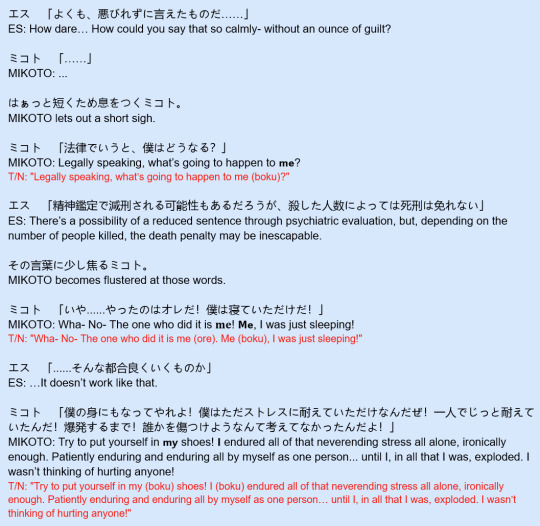
es never questions mikoto's (オレ) 'confession', nor his weak and generic responses to being pressed for further details, nor really the logistics of a self-state alone committing murder. in fact, mikoto's (オレ) vague descriptions of his acts only seem to convince them further.
when es seems thoroughly convinced by the confession, mikoto (オレ) once again checks with where es is at with their ruling, allowing him to gauge his next course of action with his interrogation strategy. after learning that es believes the conventional approach to these situations would be capital punishment, mikoto panics (オレ).
(as per usual, this response is likely both because he (as a dissociated part of himself) genuinely feels mortified at the idea of his normative self being punished for things his normative self 'did not do' (despite the fact he only gets the impression he has an innocent, normative self because he has psychologically removed all his shameful acts from that mental construct), and because he would definitely rather not physically die or be punished as a human being — the ideal is that he is able to blame something that does not really exist or exists outside of him, to avoid taking responsibility and having to integrate or face his acts.)
in response to es' unresponsiveness to the notion that normative 'mikoto' should be let off and go unpunished if it was 'only ore's (オレ) fault', mikoto (オレ) begins spinning sympathy for his normative self.
first he (オレ) claims his normative self was 'asleep' for his murders, emphasising his uninvolvement, but also vulnerability. when that doesn't work, he (オレ) shouts at es to empathise with 'mikoto's' position, highlighting how pitiful, alone, well-behaved, and sensitive mikoto is, and frames him as a victim, highlighting how the cards were just all stacked against him.
he (オレ) asserts that that 'mikoto' has always been doing everything right, that anything he didn't do right was never 'him'. he implies that the worst thing 'mikoto' ever did was simply 'give birth' to ore (オレ), and that even that wasn't his fault, and that 'he' never wanted, nor had control over, the acts he associates with ore (オレ). he may or may not truly believe this. he may only emotionally believe it, or even just want to believe it. nonetheless, it's a convenient reality to propose.

in response to es buckling down about the conventional legal approach to these matters (and bringing attention to the fact that human life was lost), mikoto (オレ), in return, buckles down on his emotional argument and illusory binary, and pressures es to approach him as 'themself'.
i find that by drawing attention to es' judgement as an individual, rather than an agent of law, mikoto (オレ) forces them emotionally off-balance and distances them from their typical desire to be objective and ruthless as the warden, giving them an uncertainty they betray in the tone of their response. this plea also encourages es, in their emotionally vulnerable state, to approach him (or more specifically, the victimised 'mikoto'), in turn, as a person they've come to know and grown attached to, likely making them more sympathetic and prone to forgiveness to preserve 'mikoto's' wellbeing (consider how Milgram's audience generally buys the idea that mikoto is a helpless victim, and feel bad at the notion of voting him guilty, especially if that means that, as mikoto (オレ) alludes to earlier, normative 'mikoto' will vanish and only his 'other personality' will remain).
ultimately however, it's interesting to note that despite the fact that es is ultimately uncertain on any strong conclusion on if mikoto's account of events means mikoto should be forgiven (as this judgement is the audience's job), they are never seen to question — nor does Milgram encourage the audience to question — mikoto's binary, his claims that he was possessed by his other selves and unable to control himself, or his claims that his other selves are 'not him'.
this manner of approaching his crime — seeing him as a person who, somehow, operates fundamentally differently to others due to his diagnostic label — echoes the sentiment kotoko proposes when giving him the DID diagnosis in Trial 1. es even reiterates it, almost verbatim. however this time, because mikoto has been able to adapt to his circumstances, he has been able to use the Neoplasm interrogation to take control of, play up to, and reinforce the models applied to him as a prisoner and person labelled with DID to guide the audience's discourse around his crime, in his favour this time.
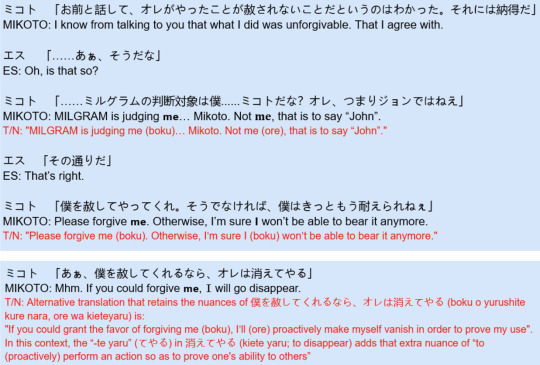
by echoing es' own language and using their preconceptions against them — calling himself 'john' for the first time when concluding his pitch and strategy for forgiveness — mikoto aligns himself with es' stigmas and belief that mikoto (オレ) is a distinct entity from mikoto that must (and can) be defined, and twists this to guide es' approach to judging, reinforcing the illusion that mikoto's acts were not perpetrated by himself.
mikoto (オレ) also calls back to his original plea to hurry the forgiven vote, begging es to forgive him so he can preserve his vulnerable normative 'mikoto' identity construct and save himself from having to challenge the illusion of his normative reality any further; mikoto wants to forget all this, go back to normal, and escape consequences for his actions, in a fight for his own self-preservation and due to his need to return to and function to act as part of society, where his societal- and self-worth lies.
i find it very compelling that mikoto's ultimate argument is to promise that if he is forgiven ore (オレ) will 'disappear', since i find that this argument echoes and manipulates how the insanity defense is constructed in certain parts of the world; he makes it out that he was not in control of himself and therefore cannot (or at least, should not) be held legally responsible or punished for his acts, but also that he does not have to be removed from society for being unable to be held responsible, because the mental illness that perpetrated those acts has been identified and is going to vanish imminently.
(this is another way mikoto's binary is practically and psychologically useful. by framing himself as only having two personalities, he makes it seem that by 'disappearing' his scapegoat part, mikoto will only have one personality left, making him be 'normal' again, not only no longer associated with a crime or poor behaviour, but also longer be mentally ill at all. this helps when it comes to the verdict — i'm sure some insane people saw ore (オレ) disappearing through magical lobotomy as a good thing and as his disorder and disruptive behaviour being 'cured' — and also helps mikoto cope with his selfhood, dissociating himself from all of this, labelling it as more-or-less outside forces that do not have to disrupt his sense of self.)
ultimately, mikoto, functionally, promises that from now on, he will always be in control like anyone else, and that he will now be normal, functional, and socially acceptable, like he 'always has been', and always strives to be, unwilling to acknowledge the extent of his self beyond his normative identity constructs, or the damage that his intolerance towards himself has had on his mental health. based in his, already, well-established dissociative coping mechanisms that have kicked into overdrive thanks to the stress and social pressures of Milgram, mikoto is desperate to cut himself off from and dissociate from everything he cannot tolerate about his acts and hates about himself, and, by responding to labels coercively applied to him, attempts to secure his safety to do so by appealing to and convincing authorities that he should not be held responsible, that he should not be interrogated, and that he should be let free.
conclusion / tl;dr:
mikoto is a highly adaptable, socially conscious character, who comes from a culture that values functioning, social cohesion, and conformity. due to how he has developed in his environment, mikoto finds himself prone to repressing and disowning parts of himself, including his anger, his socially unacceptable acts, his overwhelming internalised shame, the fact that he struggles with his mental health, and the fact that, under the pressure of his life and expectations, he commit mass murder, amongst other things, which leads him to display dissociative tendencies, such as feeling like he is 'not himself' at times, or that his acts were not perpetrated by 'him'.
upon being taken to Milgram, his normative reality-illusion that is phobic of all intolerable acts and parts of himself is challenged violently, and after being triggered very severely and voted unforgiven in the first trial, mikoto finds himself in a very vulnerable social and mental spot, and finds himself unable to maintain a sense for himself that he is normal and okay. this leads him to feel 'not like himself' a lot more often.
towards the end of the first trial, due to kotoko's suggested diagnosis in attempting to explain his strange behaviour, figures of authority around him (es and the audience) begin to apply the label and model of DID onto him. with this came the characters' and audience's stigmas, preconceptions, and preestablished narratives around DID, which, due to always reading the room and hearing the audience's voices, mikoto becomes attuned to, which influences his character development, self-image, and way in which he begins to understand and frame his crime to himself and others.
mikoto, as a socially vulnerable person with a weak sense of self, begins to introject narratives around himself, his suffering from mental illness, and his having DID, which impacts how he engages with the other prisoners (mainly by self-isolating and assuming they will be or should be scared of him), and relates to himself (wherein he begins to internalise a belief that he has other, uncontrollable selves that are dangerous and wrong, and shames and abuses them for being that way).
mikoto also, having internalised this, acts according to this way of understanding himself during his Neoplasm interrogation, and performs himself according to conventional understandings of overt personality switches to distinguish his 'other' selves from his normative, and uses his high social consciousness, responsiveness, and expectations es demonstrates according to their understanding of how he, as a 'person with DID', functions, to get them on board with the assertion that 'mikoto' should not be held culpable for his crimes, securing for himself a forgiven verdict in the attempt to protect his ego and allow himself to return to a normative reality in which he can feel like 'himself', and no longer have his selfhood attacked.
this strategy has the added benefit of reinforcing to mikoto his own desirable belief that the him that feels like 'himself' is truly innocent and unobjectionable, and that everything intolerable he has done and is that he been forced to face is 'not actually him', and will imminently vanish from his life, reassuring him that he may have a chance to escape Milgram physically and relatively psychologically unscathed, to continue self-destructing in repression and overwork, in peace.
in this way, mikoto's DID label, although abusively established and used to dehumanise him, becomes a valuable tool for getting himself out of a murder charge that he would otherwise not be able to bear confronting, or make a compelling argument to excuse himself for. by conforming to rudimentary understandings of DID and manners in which people with DID have been dehumanised, mikoto is able to present and see himself as a binary of selves, which becomes vital not only for protecting himself psychologically, but for convincing others that his psychological and coercively-applied-to-him binary is practical and 'real', allowing him to physically escape punishment and consequences for his acts, and assure himself and others that his other 'self' that he hates and blames for all his flaws and humanity, can be separated from him and 'vanished' for good.
epilogue / reflection
ooohhh my god. real ones know how much this essay made me want to die. i seriously didn't expect it to be so long i promise i don't know what happened it regularly brought me into fits of despair. but it's done. i'm glad i wrote it but i'm also so glad it's over.
i'm never writing on this dipshit again. sayonara you weeaboo shits.
(^ this is a joke. but i don't think i have anything else to say about him at the moment! i think this and my other essays really might be the vast majority of my views on his presentation. i'll probably have more to say come T3 but, for now, shrug.)
as always, please let me know if any of this is incomprehensible (whether thats grammar, my word choice, or my trains of logic). i am very happy to clarify and reword bits, it is important to me that my essays can be understood by anybody!
and, congratulations for finishing, you have read very almost 10k of non-stop mikoto analysis. go drink some water and take an eye break. please. for me. thank you!

71 notes
·
View notes
Text

hello milgram fandom [original]
63 notes
·
View notes
Text

im craving ramen. everyone lets go eat ramen, i'll pay for all of us
132 notes
·
View notes
Text
old mikosys design hcs i still like
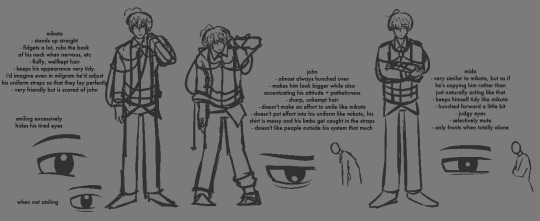
58 notes
·
View notes
Text

Hello. I return with Mikoto armadillo content. Good day.
78 notes
·
View notes
Text

parasitism
105 notes
·
View notes
Text
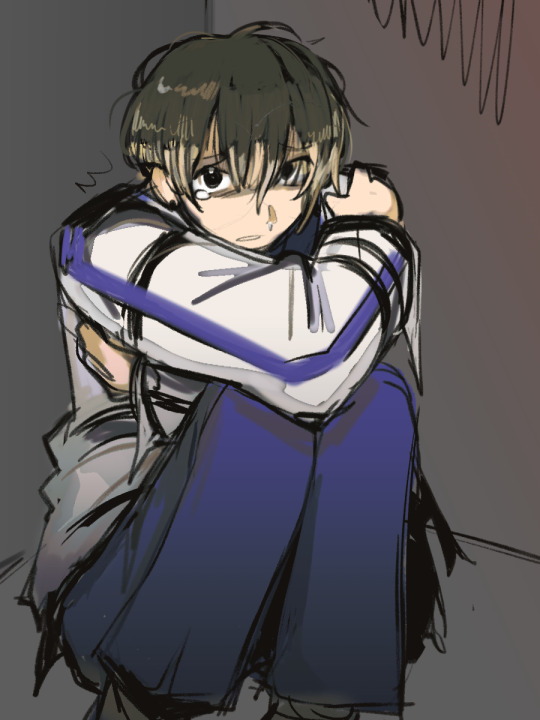
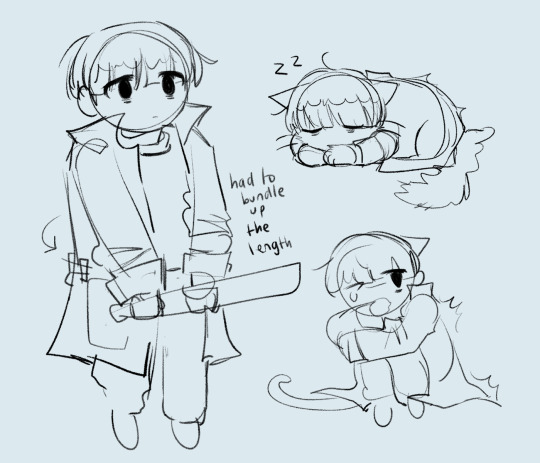
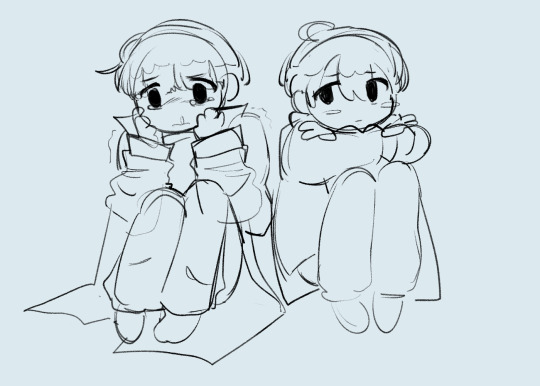
yamanaka give us mikoto child alter in the t3 vd or we riot
90 notes
·
View notes




